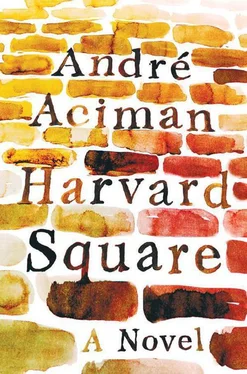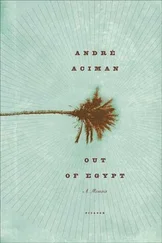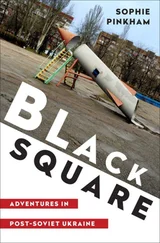The first thing I did after she was gone was to call Claude. Claude was aware of what happened to his friend, whom he refused to call Count, as we all did to make fun of him. “Piero knows some very powerful people in Italy. They could cause Kalaj serious problems. He could also make things difficult for you for hosting the brawl and for me as well for bringing him to it.”
“Plus Count has two broken teeth,” I said.
“Plus Piero has two broken teeth,” he corrected.
We had to come up with a plan.
I told Claude not to do anything. I would rush over to his house and together we’d work out some sort of plan to discourage Count from filing with the police.
When I arrived at Claude’s house, nearby, he’d already had a conversation with Count.
“But I thought you were going to wait for me?”
“Well, I had an idea and I called him right away.”
“Were you afraid I might insist on talking to him first — is that what it is? Now you’ve just made things ten times worse,” I told Claude.
“How could I have made things worse if Piero says he won’t file anything with the police.”
“Count won’t?” I asked, dumbfounded.
“No, Piero considers Kalaj a wretched marocchino who’ll soon enough get himself deported one way or another. Besides, this is his last year in Law School and he wants to put last night completely behind him. He’s already made an appointment with a famous dentist in New York and is flying there this afternoon to be seen on Sunday. Then he comes back and wants nothing to do with your friends, or my friends, which means you, of course, and that poor woman.”
“Count gets new teeth and she goes back to babysitting. Count was right about women seldom getting a second chance,” I said, trying to underscore the irony of the situation.
“Your problem is you lost someone who could have been an important friend to you.”
Claude, a social climber? I’d never seen that side of him before.
I WAS SO happy to hear that Count was not going to go to the police that I immediately called Léonie and told her the news. She was not happy to hear that Count had buckled, but she was relieved. Things would get back to what they’d been before Kalaj. This, I felt, was perhaps the story of his life. No matter how long you knew him, and how he disrupted the world of those around him, eventually he’d be out of your life and things would go back to being what they’d been before him. Despite his dogged efforts to recast the world in his own image, he made no impact, changed nothing, left no mark. In fact, he’d already walked out of history and the family of man long before he or any of us knew it. He reminded me of a mythological beast that the earth sprouts forth on some demented whim and that wreaks great harm on earthlings, ravages the countryside, and then, without explanation, is suddenly swallowed back up by earth. The dead are forgotten, the wounds heal, people move on.
Eventually I did arrange for Kalaj and Léonie to meet. Perhaps they should not have met, for both managed to unearth a demon neither probably suspected they had in them. When they met in public a few days later, things seemed to go very well. Kalaj took Austin under his wing again and was kinder than any father could be to the boy. But one evening, he showed up at Café Algiers with scratch marks streaked all over his neck. When he rolled up his sleeves, I saw that his right forearm was full of bruises. “What on earth is going on?” I asked.
He smiled it off.
“Do you guys beat each other up now?” I asked, trying to make light of it. Had I suspected the truth, I would never have asked.
He didn’t answer. Then, a few seconds later, as if out of nowhere, he said, “Sometimes.”
“Sometimes?”
“We like it.”
“You what ?”
“Some people need drugs. Others alcohol. She likes to slap me.”
“Do you really like it when she slaps you?”
I couldn’t believe my ears.
He thought about it as though the question had never occurred to him before. Who in his right mind would dare ask such a question of a Berber?
“I don’t mind,” he said.
“You’re both sick.”
“We are.”
Had he pushed his self-destructiveness so far?
It couldn’t last. Léonie broke up with him one evening at Café Algiers. She dashed in through the back door, walked up to our table, told him “Écoute, c’est fini,” gave him a plastic bag in which some of his things were folded, and walked out.
“Everyone does this to me,” he said. “Either they shut their door to me or they bring me remnants. As if I needed remnants and underwear.” And with all his might and all his rage, he hurled the plastic bag into the kitchen area. The owner of the café came out of the kitchen, walked to our table, and said, “If you go on like this, you won’t be able to come here.”
“What did I tell you?” Kalaj turned to me without even looking at the owner. “Everyone shuts their door in the end.”
The whole scene put me in a terrible mood, because it did not just make me think of the numberless times I too had promised to shut my door at him and have no more to do with him, but of how close I myself had come to seeing Harvard’s door shut in my own face.
I BEGAN TO AVOID KALAJ. PERHAPS MY TEACHING obligations, now that the semester was in full swing, took me away from him. Perhaps I felt I belonged to Harvard more than I had allowed myself to believe. At a meeting of the Committee on Degrees in History and Literature, I had made a proposal pertaining to the quality of senior theses. Someone objected to my proposal, I began to explain its merits, there was a vote, and my proposal was approved. I felt validated and vindicated. All it took was a near-unanimous show of raised hands, and suddenly I loved Harvard, loved rubbing shoulders with the brotherhood of Americans.
There was also the possibility of a new woman in my life, Allison, though I still wasn’t sure which way things were headed. I didn’t want Kalaj to see us together, nor did I want him to see who I became, or how I behaved or even spoke when I was in her company. He would undoubtedly have dubbed me affected, precious, no less a social climber than Claude was in my eyes — and perhaps I was. But the irony is that I was probably no less affected as a Mediterranean among the habitués of Café Algiers than I was among WASPs at Lowell House.
But then something else was troubling me, and Allison’s presence made me see it more clearly. It’s not just that I did not want Kalaj to see me with her; I didn’t want her to see me with him. She was candid, bold, straightforward, and freethinking in so many unforeseen ways, willing to try many things that were not part of the immediate world she’d been brought up in. Nor was she a snob, though some might have thought so, if only because she moved in circles where everything was rarefied and where you never had to think of cost, even when you felt you needed to pretend to. She knew the things she liked and was used to and was seldom aware of their far inferior and cheaper version everyone else in the world purchased. Her family always traveled first-class; it would never have occurred to her that one could also travel coach. She had never in her life seen the back of an airplane or thought it possible to sit in the cramped spaces everyone else flew in. But she was discreet in everything. She never ordered more than two drinks because she didn’t like being sloshed; I never ordered more than two drinks because I’d have no money left for dinner. It would never have occurred to her that buying four drinks each, three days in a row, could mean my financial ruin. But she had perfect judgment, and once she was told about the rest of mankind and its strapped budgets, she made all the necessary adjustments with the surefire ease with which a rich person knows how to dress down when visiting poor relatives in the suburbs. Above all she was a very canny reader of people and could instantly have distinguished an uncommitted truant like me from a confirmed vagrant like Kalaj.
Читать дальше












